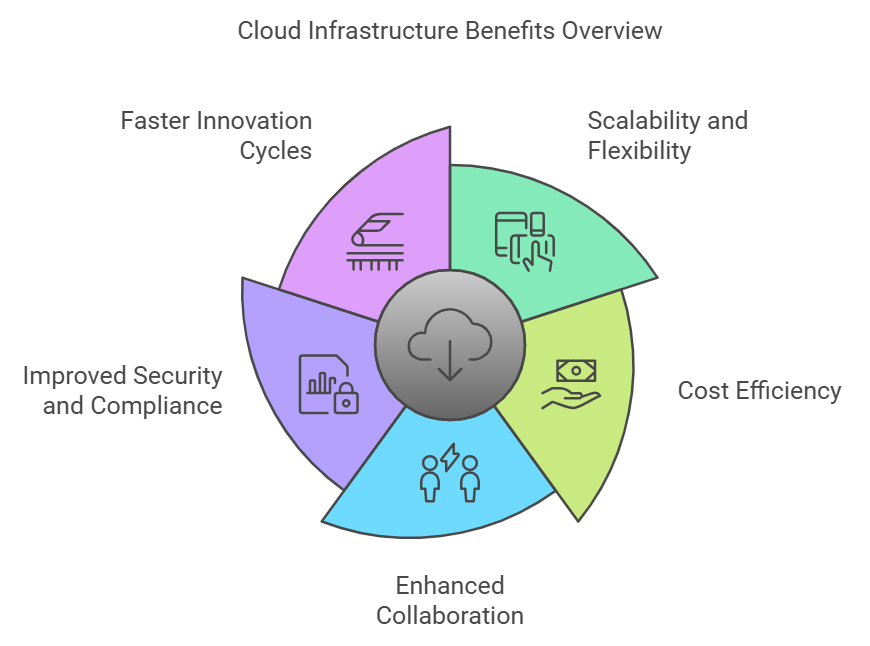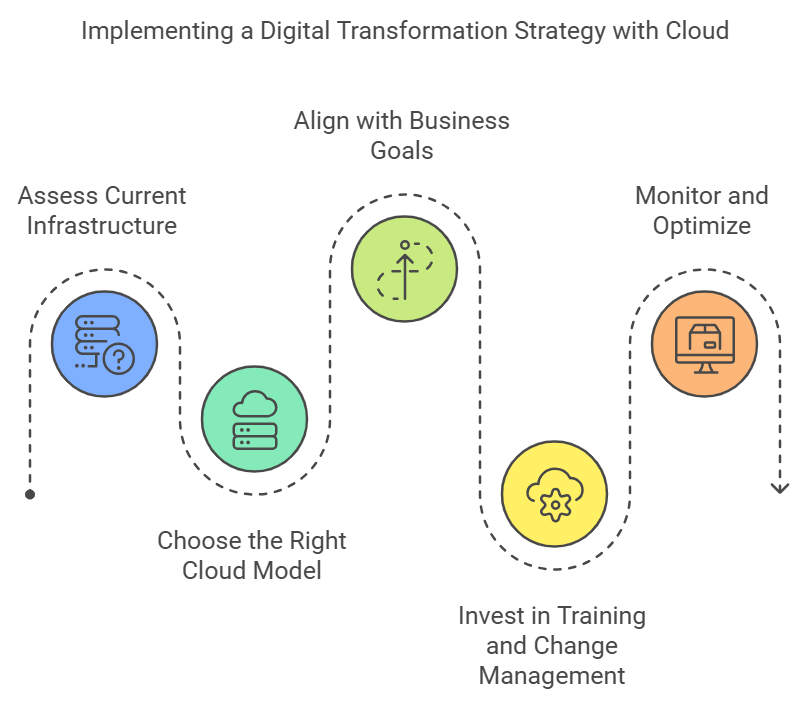
Why Cloud Infrastructure is Essential for Digital Transformation
- by mayank.thapa
Today the business world is advancing at very high rates due to technological changes and every business wishes to embrace the best strategies that will enable it to embrace change, expand, and be efficient. There is nothing more quintessential to this change than a strong playbook for digital business, the cloud infrastructure service serving as that ecosystem’s foundation. This means that cloud solutions for work, collaboration, process management, and innovation offer businesses extraordinary opportunities and transformations.
From this article, you will learn of the critical function of cloud infrastructure services in fostering Digital Evolution, the benefits that companies continue to accrue from cloud adoption, and more critically, how any organization can harness the power of the cloud for sustainable growth.
Understanding Cloud Infrastructure and Its Role
What Are Cloud Infrastructure Services?
Software as a service gives users access to application software over the internet on demand and in a scalable manner. These services do not require physical infrastructure hence are flexible and can support innovation and increased business.
Key Components of Cloud Infrastructure:
- Compute: Servers or container versions such as the Virtual machines.
- Storage: It defines scalable data storage solutions.
- Networking: especially the main factors of purchase, such as secure and reliable connectivity.
- Security: Evolution at an advanced level of data protection and applications.
Why Are Cloud Infrastructure Services Integral to Digital Transformation?
The very essence of every digital transformation strategy is the ability to be limber, productive, and capable of being exponentially expanded. Cloud infrastructure services are critical in digital transformation because they help organizations update processes, streamline operations, and improve customer satisfaction.
Advantages of Cloud Infrastructure for Digital Transformation

1. Scalability and Flexibility
The realities of the modern business environment require solutions that can be easily adjusted. Storage and computational capabilities may be purchased with the infrastructure services and adjusted up or down according to the company’s requirements.
Example: The traffic increases that commonly occur during specific seasons can be accommodated without having to invest in more physical servers.
2. Cost Efficiency
The normal traditional information technology accompanies much capital outlay. For cloud infrastructure services, it means that instead of managers dictating expenditure sums for each company division, companies can switch to implementing a pay-for-use system.
3. Enhanced Collaboration
Cloud platforms enhance collaboration as information sharing is immediate as it is shared on common platforms. This is especially crucial when it comes to the proper executive of a proper and efficient digital transformation framework that includes remote or hybrid working.
4. Improved Security and Compliance
That said, present-day cloud hosting services are equipped with mechanisms that provide security; for instance encryption, firewalls, and compliance measures that would enable businesses to protect their information.
5. Faster Innovation Cycles
The cloud makes development and deployment faster, thus helping businesses to get to market, with products and services faster.
Cloud Benefits for Business: Why Does It Matter?
The discussed cloud benefits for business are not limited to operational improvements. They include:
1. Business Continuity
Backups and disasters can no longer be seen as a luxury but as a necessity as far as time-sharing is concerned. Cloud solutions help business organizations to continue operating even under unpredictable circumstances.
2. Global Reach
By using cloud infrastructure services the firms can extend their operations geographically without having to invest in local computing infrastructure.
3. Data-Driven Insights
The cloud is also functional for analytical processing, which enlightens businesses about the extraction of valuable data and facilitates reshaping the analytic strategy of digital transformation.
4. Green IT Practices
Pay for usage and availability leads to sustainability since it allows companies to minimize dependence on actual physical infrastructure while at the same time reducing energy expenses.
5. Enhanced Customer Experiences
Real-time data processing and heavy interactions for growing applications allow organizations to provide a much better customer experience, which is a key focus of digital transformation.
Implementing a Digital Transformation Strategy with Cloud

Step 1: Assess Current Infrastructure
Assess existing IT systems in order to determine their strengths and their weaknesses.
Questions to Ask:
- What unutilized resources are you currently experiencing within your infrastructure?
- Hence the question is what processes can we use cloud infrastructure services to optimize?
Step 2: Choose the Right Cloud Model
Based on your company goals and the degree of IT security necessary, choose between a public, private, or hybrid cloud model.
Key Considerations:
- Public Cloud: Cost-effective and scalable.
- Private Cloud: Better protection of data in the organization or company.
- Hybrid Cloud: This is actually a hybrid of the two extremes.
Step 3: Align with Business Goals
Since digital transformation is a multidimensional concept, clarify that your digital transformation strategy is connected to company goals, including loyalty, efficiency, and creativity.
Step 4: Invest in Training and Change Management
Train your employees on how to go about realizing the cloud benefits for business successfully.
Step 5: Monitor and Optimize
Remain fully aware of the way your cloud environment is used and how it performs across usage and economic metrics to optimize infrastructure for changing business needs.
Industries Leveraging Cloud Infrastructure for Digital Transformation
1. Healthcare
Cloud solutions help to provide telemedicine, use electronic records, and share patient information, transforming patient care.
2. Retail
For stock management, customer suggestions, and safe online transactions, electronic commerce firms use cloud infrastructure services.
3. Manufacturing
This is a common practice in the cloud to support Predictive maintenance based on IoT, logistics optimization, and real-time monitoring.
4. Finance
Banks and other financial organizations use cloud technologies for the identification of fraud, compliance with regulations, and for managing customer information.
5. Education
Answer- Remote learning as we have seen uses the cloud in the delivery of effective and engaging educational interfaces.
Conclusion
We can now affirm, absolutely, that for any business to successfully transform its digital structure, cloud infrastructure services are a necessity in any digital transformation strategy. Starting with scalability and moving down to improved security, it is evident that the cloud holds unique benefits for business wherein it provides organizations the capabilities for creation, competition, and expansion into a world that is now increasingly digital. In fact, through the use of the cloud, not only do corporations work more efficiently, but they also set market trends for their areas of specialization.
To learn more about how the cloud can help your company unlock its digital transformation efforts, go to Value Innovation Labs or log in to valueinnovationslabs.com.
Frequently Asked Questions
- What is cloud infrastructure service?
Answer- Well-arranged cloud infrastructure service offers computing resources that include servers, data storage space, and networking so that organizations can run without inward IT AN infrastructure.
- Why is the cloud critical to digital transformation?
Answer- Scalability, cost advantages, and acceleration of innovation cycles make the cloud relevant for any plan of digital transformation.
- What are the essential Cloud Advantages for Business?
Answer- Some of the many advantages include improvement in cooperation, geographically wide distribution, cost reduction, information security, and value addition to customers.
Today the business world is advancing at very high rates due to technological changes and every business wishes to embrace…
